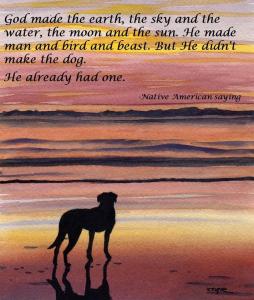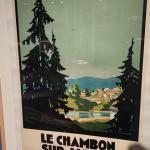In the honors interdisciplinary program I teach in, my colleagues and I have chosen over the past two years to include a selection of material from A Listening Wind: Native Literature from the Southeast, a collec tion of stories, fables, myths, and poems from Cherokee literature. Among many candidates, my favorite of the several dozen short texts we assigned is Hasting Shade’s “The Spirit of an Ancestor.”
tion of stories, fables, myths, and poems from Cherokee literature. Among many candidates, my favorite of the several dozen short texts we assigned is Hasting Shade’s “The Spirit of an Ancestor.”
On the most basic level, this is a simple “coming-of-age” story. The author grew up along the Illinois River, which he fished and swam in for as long as he can remember. As he got older, he ranged farther along the river and occasionally camped out overnight. At the beginning of “The Spirit of an Ancestor,’ my guess is that the author is in his early teens. He has selected a place about seven miles upriver from home and asks his father to take him and a boat the two of them had built to the spot. Estimating that it will take him three days to get back, Shade’s father drops him off with food enough for that evening’s meal packed by his mother. It will be up to Shade to catch and find food to eat for the rest of the trip.
In our world of helicopter parenting and “stranger danger,” there’s something refreshing about a young man being trusted sufficiently by his parents to go on an adventure by himself when any number of things could obviously go wrong. The “What ifs?” could have been overwhelming—but Shade’s parents not only allowed him to go but did what they could to facilitate it. Part of this is undoubtedly because he was raised with a Native American love and respect for the natural world. But I’m also reminded of the many times when my mother sent my older brother and I, from the time we were 10-11 and 6-7 respectively, forth from our rural Vermont home into the “wild” after breakfast on a Saturday morning saying, “See you at 6 for dinner.” And we lived to tell about it.
Shade’s father leaves him upriver with one directive: “If you see a stranger and if he’s hungry, feed him.” After setting up camp the first night, he is sure that he hears people speaking in Cherokee, but he doesn’t see anyone, and the language he hears is in a dialect that he doesn’t understand. Eventually the language turns to song—Shade writes that “I knew they were being sung by someone a lot older than anyone I knew . . . I listened to the songs, never understanding what they were saying but knowing that very few people had heard what I was hearing.” Remembering that his grandfather used to say that “If you hear something that you don’t understand, the Creator knows what is being said,” the author files the experience away and falls asleep.
A couple of nights later, the night before Shade is scheduled to make it back home, he has just found a place to set up camp when an old man approaches him. “You wouldn’t mind sharing your supper, would you?” the man asks. Remembering his father’s words at the beginning of his trip, Shade invites the old man to share his freshly caught fish when the old man has a better idea. “Let’s go to my house and cook them. I live just across the field, not very far. Your boat will be safe here.” And off they go.
After a delicious meal, a deep conversation commences in which the old man “told me many things about the past and what might happen in the future.” He even tells Shade the name of the girl he will marry, even though she and her family had not even moved into the area yet. When the author tells the old man about the voices and songs he had heard the first night he was on the river, the old man says “Oh that was just the Little People. They still know the Ancient Language; that is what you heard. Sometimes I go up there and dance with them.”
When Shade wakes up the next morning, the cabin is empty—the old man is already gone, and Shade never saw him again. “We never told each other our names, but he knew mine.” Upon returning home that afternoon, his mother’s first words are “My, you look like you grew up these last three nights.” Later, he mentions the old man to his father, asking “Do you know him?” As it turns out, Shade’s father did know the old man, who “told me many things” just as he had to Shade. “What is the old man’s name, Dad?” Shade asks.
I don’t know. He died when your Grandpa was young. Don’t look for the house where you stayed the night, because it isn’t there. Someone burned it down right after the old man died.
Shade ends his tale with a final reflective paragraph.
As the elders say, “The spirit never dies.” The old ones, the ones that have gone on before, will always be with us. Sometimes they come and try to tell us something, but we have forgotten how to listen. Then again, maybe someday they will talk to me again.
It’s a simple, beautiful story. At the same time, so many things demand explanation. What/who was responsible for the voices and songs Shade heard the first night? Who was the old man? How could the old man have died when Shade’s grandfather was young if both Shade and his father ate a meal and spent a night with him? How could the house that Shade had slept in the night before have been burned down years ago? Inquiring minds want to know!
In the introduction to A Listening Wind, the editor provides some framework and guidance for how to approach the stories contained in the volume, much needed guidance for a Western mind that insists on explanation for everything.
Encounters with the spirit world, the uncanny, and the seemingly inexplicable are worthy of careful thought . . . Within a Cherokee communal context today, stories of the wondrous, ulvsgedi, are presented with little to no context or explanation; either one is aware of the deeper implications of the experience and story . . . or one is not. It is clear that stories of the wondrous remind us that existence is larger, more complex, and more alive than how we often imagine it in our quotidian lives.
As Hamlet told his friend, “there are more things in heaven and earth than are dreamed of in your philosophy.”
Scattered like seeds throughout this story are unadorned and simple truths that should resonate with any person of faith, truths all the more powerful because they are not wrapped in dogmatic or doctrinal straitjackets.
- If you meet a stranger and if he’s hungry, feed him.
- If you hear something that you don’t understand, the Creator knows what is being said.
- The spirit never dies.
- We never told each other our names, but he knew mine.
Maybe someday I will get to the place where my first reaction to something unexplained or outside my experience is not immediately to doubt its veracity or to explain it away. Perhaps we all could learn to embrace the likelihood that reality is much greater than our limited categories. We would do well to cultivate listening more and speaking less. Then, maybe, they will talk to us again.













